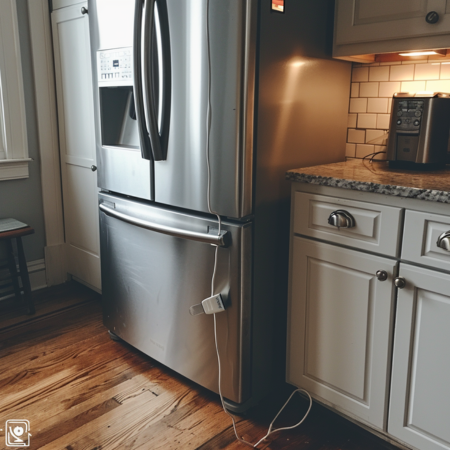When it comes to powering appliances in your home, particularly large ones like your refrigerator, you may find yourself questioning the best way to do so.
It’s not uncommon to run out of outlets in the kitchen, leading to the question – can you plug a refrigerator into an extension cord?
While the short answer might seem straightforward, there are a few important considerations to think about before proceeding.
This article explores the implications of using an extension cord for your refrigerator, factoring in safety, efficiency, and the potential impact on your appliance’s performance.
Key Points
- Safety Concerns: Using an extension cord for a high-power appliance like a refrigerator could pose a potential fire risk due to the increased load. Always ensure that the cord is rated for the appliance’s power requirements.
- Energy Efficiency: Extension cords can cause a voltage drop, leading to inefficient operation of your refrigerator and increased energy consumption.
- Durability of the Appliance: The lowered voltage from an extension cord may cause your refrigerator to work harder, potentially reducing its lifespan.
- Suitability of Extension Cord: Not all extension cords are created equal. If you must use one, make sure it’s a heavy-duty cord, designed to handle the wattage and amperage of your fridge.
- Encouraged Practice: Directly plugging your refrigerator into a wall outlet is always the best practice for safety and efficiency. If this isn’t possible, consider hiring a professional to install a new outlet near the appliance.
Can You Plug A Refrigerator Into An Extension Cord
It is technically possible to plug a refrigerator into an extension cord. But is it advisable?
Not always.
The main concern lies in safety. Extension cords are not designed for long-term use. They can overheat, leading to potential fire hazards.
The efficiency of your refrigerator can also be affected. The longer the extension cord, the more power is lost in transmission. This could result in your refrigerator working harder.
The impact on performance can’t be ignored either. A voltage drop can affect the cooling efficiency. Your food may not stay as fresh.
In short, it’s not a recommended practice. If you must do this, using a heavy-duty extension cord is important. One specifically designed for appliances.
Remember, safety comes first. Always consult an electrician if you’re unsure.
What Will Happen If You Plug The Fridge Into An Extension Cord?
Plugging your fridge into an extension cord may lead to several issues.
Firstly, the extension cord might overheat. This could then become a fire hazard.
Secondly, your fridge’s efficiency might decrease. The longer the cord, the more power you lose. Consequently, your fridge works harder. This means your electricity bill could go up.
Thirdly, the performance of your fridge could suffer. Voltage drops can hamper cooling efficiency. Your food might not stay as fresh as it should.

Finally, the constant use of an extension cord could wear it out quickly. This could lead to electrical faults or even a complete breakdown.
Therefore, avoiding using an extension cord for your fridge is best. However, if you need to, make sure it’s heavy-duty. Ideally, it should be specifically designed for appliances.
Remember, safety is paramount. Always consult an electrician if you’re unsure. This way, you can avoid any potential risks.
Remember, it’s your safety on the line.
5 Reasons You Shouldn’t Plug It Into An Extension Cord
Despite the potential convenience, using an extension cord for your refrigerator is risky. It’s a matter of efficiency and a significant safety concern. Here are several reasons you should avoid this practice:
1. Risk of Overheating
Extension cords are not designed for heavy loads. Fridges consume a lot of power. Over time, this can cause the cord to overheat.
An overheating cord is a fire risk. It could ignite nearby materials, leading to a dangerous situation.
2. Decreased Efficiency
The longer the extension cord, the higher the power loss. This means your fridge has to work harder to keep cool.
Your electricity bills will increase as a result. You are paying more for less efficient cooling.
3. Damage to the Fridge
A constant low voltage supply can damage the fridge’s motor. This could result in costly repairs or replacements.

4. Increased Wear and Tear
Relying on an extension cord for long periods can cause it to wear out quickly. This could lead to electrical faults or complete failures.
Safety should always come first. If you’re unsure, consult an electrician. It’s not worth risking your safety for a little extra convenience.
5. Likelihood of Electrical Faults and Breakdowns
Extension cords are susceptible to faults. They may fray or become damaged, creating a shock risk.
Electrical breakdowns are also more probable.
An unexpected failure could cause your fridge to stop working.
This may cause significant food spoilage.
In some cases, faults can trigger serious electrical fires.
Thus, it is always safer to plug your refrigerator directly into the wall outlet.
This ensures a stable power supply, without the risks associated with extension cords.
It’s better to reorganize your kitchen layout than to compromise safety.
Remember, convenience should never outweigh safety.
Things To Consider When Buying An Extension Cord For A Refrigerator
If you find it necessary to use an extension cord despite the potential risks, it’s imperative to choose one suitable for your refrigerator’s needs.
Making an informed decision can mitigate some risks associated with using extension cords.
Things to Consider
- Cord Length: Shorter cords are more efficient and pose less of a fire hazard.
- Cord Thickness: A thicker wire can better handle the load of a refrigerator.
- Safety Certifications: Ensure your extension cord meets safety standards.
- Surge Protection: Opt for an extension cord with built-in surge protection to protect your fridge from power surges.
What Should Not Be Plugged Into An Extension Cord?
Certain devices should not be plugged into an extension cord. These include high-wattage appliances such as heaters, air conditioners, and microwave ovens.
The heater draws a lot of current. This can overheat extension cords. It’s a fire hazard.
Air conditioners are similar. They require a steady power supply. Extension cords might not deliver this consistently.
Microwave ovens also consume high power. They can damage extension cords over time.
Always plug these appliances directly into a wall outlet. It’s not worth risking a fire or damaging your appliances.
Similarly, avoid daisy-chaining extension cords. This means plugging one extension cord into another. It’s another potential fire hazard.
Always prioritize safety over convenience. Use extension cords sparingly and wisely. And, remember to unplug them when not in use.
Inspect your extension cords regularly. Look for signs of fraying, overheating or damage. Replace them immediately if needed.
Frequently Asked Questions
FAQ 1: Can Extension Cords Cause a Fire?
Yes, extension cords can cause a fire if improperly used. If overloaded, the cord can overheat, compromising the cord’s insulation and sparking a fire.
FAQ 2: Are All Extension Cords Safe for Outdoor Use?
No, not all extension cords are safe for outdoor use. Look for extension cords specifically marked for outdoor use. These cords have durable coverings made to withstand the elements.
FAQ 3: Can I Use an Extension Cord for my Refrigerator?
While it’s better to plug your refrigerator directly into a wall outlet, using an extension cord is possible if necessary. Make sure you choose the right cord, considering aspects such as cord length, thickness, safety certifications, and surge protection.
FAQ 4: How Long Can I Leave an Extension Cord Plugged In?
While there’s no definitive time limit, unplugging extension cords when not in use, especially when leaving the house or going to bed is advisable.
FAQ 5: Why Shouldn’t I Daisy-Chain Extension Cords?
Daisy-chaining, or plugging one extension cord into another, can overload the circuit, causing a fire hazard. It’s generally unsafe and against most fire regulations.
FAQ 6: How Can I Tell If My Extension Cord is Damaged?
Look for signs of fraying, splits in the insulation, exposed wires, or burn marks. Also, if the cord becomes unusually hot to touch, it might be time to replace it.
FAQ 7: Can I Repair a Damaged Extension Cord?
While it might be possible to repair minor damage, replacing a damaged extension cord is generally safer. A licensed electrician should do any repair to ensure safety.
Conclusion
Following safety guidelines with extension cords is crucial.
They are practical tools that provide flexible access to power.
However, incorrect usage can result in electrical fires, electrocution, or damage to devices.
Inspect your cords regularly for signs of wear and tear.
Ensure that you use cords suitable for the environment and load.
Never overload circuits by daisy-chaining extension cords.
If damage is detected, replacement is the safest course of action.
By adhering to safety guidelines, you can enjoy the convenience of extension cords without undue risk.
- Can You Put Microwave Popcorn In The Oven: Pros And Cons - May 14, 2024
- Can You Scrap A Microwave And Why You Should? - May 13, 2024
- Can You Put Metal In A Convection Microwave: 10 Major Risks - May 12, 2024

